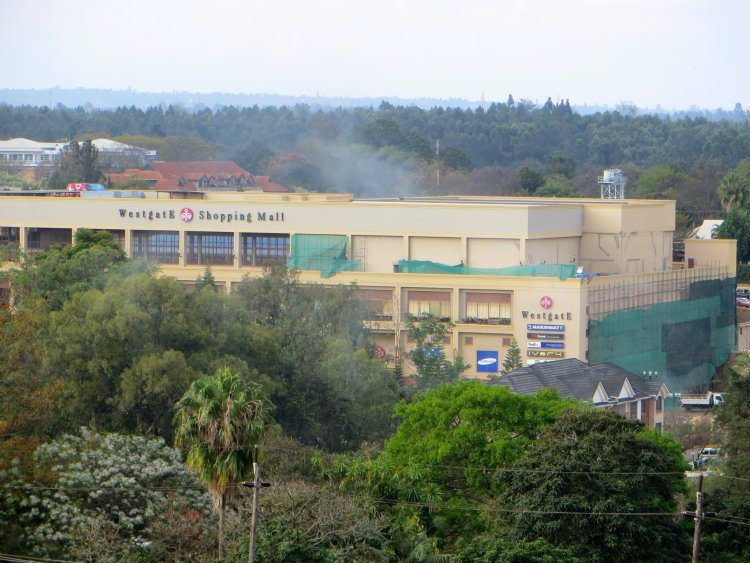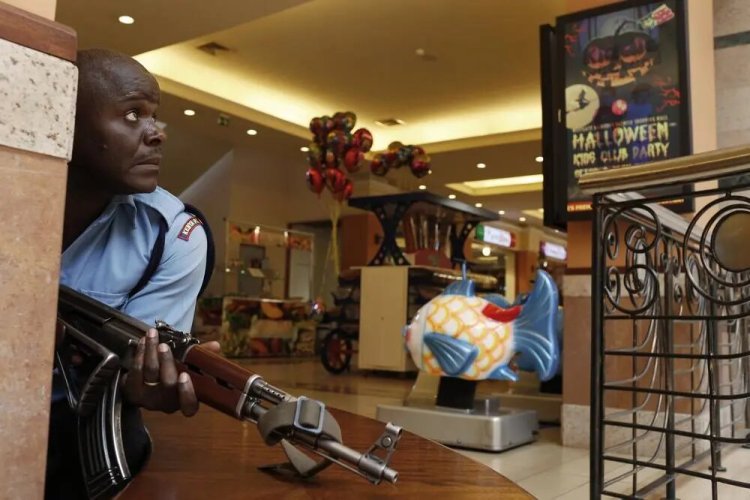How Blunder In Westgate Attack Led To Birth Of #FichuaKwaDCI Hotline
These among other measures including embracing the multi-agency approach in responding to security threats have ensured that the safety and security of every citizen has been assured.

10 years ago today (September 21, 2013), the Westgate Shopping Mall in Nairobi was turned into a terrorist zone as members of the Somali-based Islamist group Al-Shabaab launched an over-48-hour assault on the premises, killing at least 71 people including 62 civilians, five Kenyan soldiers, and all four gunmen.
On the fateful day at around midday, the militants stormed the high-end Westgate Mall throwing grenades and firing indiscriminately at shoppers in a coordinated slaughter that also left approximately 200 people wounded.
Al-Shabaab later claimed responsibility for the incident, terming it as revenge for the deployment of the Kenya Defence Forces (KDF) troops to Somalia under 'Operation Linda Nchi' in 2011.
However, the Directorate of Criminal Investigations (DCI) uncovered on Thursday, September 21 details preceding the attack that detectives discovered had taken months of planning.

A police officer taking cover during the 'Siege of Westgate' on September 21, 2013. /AL JAZEERA
How Westgate Attackers Exploited Blunder In Communications
Investigations revealed that the notorious militants based in Somalia joined efforts with their contacts at the Kakuma refugee camp and in Nairobi on the attack.
"They avoided detection from detectives thanks to the then lax procedures in obtaining mobile phone SIM cards which they used to communicate. As sleuths later found out, eight (8) mobile phone lines directly linked to the attack were registered in Nairobi and switched on days before the attack," stated the DCI in part.
The Aftermath
The shaky and questionable response to the attack that exceeded the 48-hour mark meant that DCI had to learn from its mistakes, and has since implemented strategies to avoid a repeat of the siege at Westgate.
One of the strategies was developing the human resource capacity of the DCI officers to respond to the contemporary security demands of time.
Consequently, the DCI-Anti-Terrorism Police Unit (ATPU) was upgraded and a highly specialised counterterrorism and hostage rescue tactical team - the Emergency Response Team (ERT) established. The well-trained and highly motivated team remains on standby 24/7 for any terror-related eventuality.
"Additionally, an anonymous, toll-free call centre dubbed #FichuakwaDCI was established at DCI Headquarters to specifically handle calls related to serious crimes such as terrorism, human trafficking and armed robberies among others.
"The call centre which receives about 50 calls in a day, half of which are actionable, has revolutionized the manner in which we gather verifiable information and respond in time before criminal acts are committed," DCI explained how the hotline operating under number 0800 722 203 works behind the scenes.
These among other measures including embracing the multi-agency approach in responding to security threats have ensured that the safety and security of every citizen has been assured.
While DCI reiterated its commitment to ensuring that the lives and property of all Kenyans are safeguarded, the investigative agency continued appealing to the public to be its partners in the fight against terrorism and violent extremism.
"We celebrate and honour the commitment of every security officer from across the country’s security agencies, involved in the ongoing multi-agency fight against terrorism.
"Ours is not only a calling but a responsibility to serve Kenyans from all walks of life with Dedication, Care and Integrity," added the DCI.
Police headquarters on their part stated they had enhanced operations to disrupt any form of insecurity related to a similar attack, incorporating private security guards who are now apparently trained on how to detect and report many forms of crimes including terrorism for action.
What Has Changed?
The attack rattled Kenya and the entire region, prompting a re-evaluation of security in public spaces. For instance, the government began profiling and watching its own citizens, ushering in a new era of mass surveillance.
Parliament passed sweeping legislation, allowing government agencies to listen to and record phone conversations without court permission. Strict enforcement of SIM registration with punitive penalties for those in breach followed.
A local telco was tapped to install and run a communication and surveillance system that is linked to police stations.
The attack also saw the country significantly increase spending on intelligence. Spending on the National Intelligence Service (NIS) has more than tripled from Ksh13.4 billion in the year ended June 2013 to Ksh44.3 billion in the current one.
The huge budget has enhanced capacity for phone, email and internet surveillance. The increased eavesdropping is reckoned to have foiled more terror attack attempts.
Today, telcos and their agents face stiff penalties for allowing unregistered SIM cards into their network or for selling pre-activated cards.
Any person who knowingly provides false information during SIM card registration is liable to a fine not exceeding Ksh100,000 or a jail term of not more than six months or both. Firms that breach the SIM registration rules face a financial penalty of up to 0.5 per cent of their annual gross turnover.
Heightened Security
In Nairobi and other major metropolitan areas in East Africa, malls, supermarkets and hotels are typically protected by gates and staffed with security guards.
It is now a routine for cars that to be checked multiple times before entering buildings; security officers often run mirrors under vehicles to check for explosives before allowing them in.
At Jomo Kenyatta International Airport (JKIA), passengers must exit their vehicles far from the entrance and pass through metal detectors on the side of the road while their vehicles are checked separately.

Entrance to Jomo Kenyatta International Airport in Nairobi. /MARVIN CHEGE.VIRALTEAKE
Thorough checks on people entering public spaces became the norm, meaning hardly can a person enter a building without being scrutinised. Metal detectors that were few and far between are now a regular feature in buildings, as is the requirement for visitors to leave their details.
Generally, better collaboration between security agencies was witnessed during the Dusit attack in Nairobi in January 2019 when security forces ended a similar siege more quickly and with fewer casualties.
The attack also led to the enactment of the Security Laws (Amendment) Act 2014 and the establishment of a Multi-Agency Taskforce. However, critics saw them as intrusive, especially particular clauses that allow government agencies to listen in to phone conversations and collect their data, such as where the calls were made.
On September 6, 2013, the Westgate attackers purchased a Mitsubishi Lancer from a garage in Nairobi. It was used to conduct surveillance, rehearse and identify potential secure routes to the mall from Eastleigh and eventually for the attack.
The undetected movement of the vehicle in part prompted the State to ink a deal with the local telco for a security surveillance system backed by thousands of CCTV cameras. The contract involved the installation of ultra-high definition CCTV cameras in Mombasa and Nairobi, connected to a command and control centre.
The national surveillance, communication and control system links all security agencies, military and police, electronically, making it easier to share information and direct operations.






